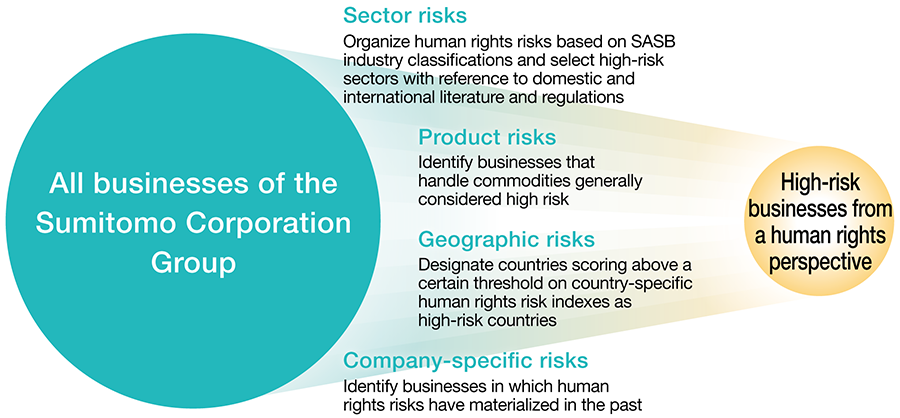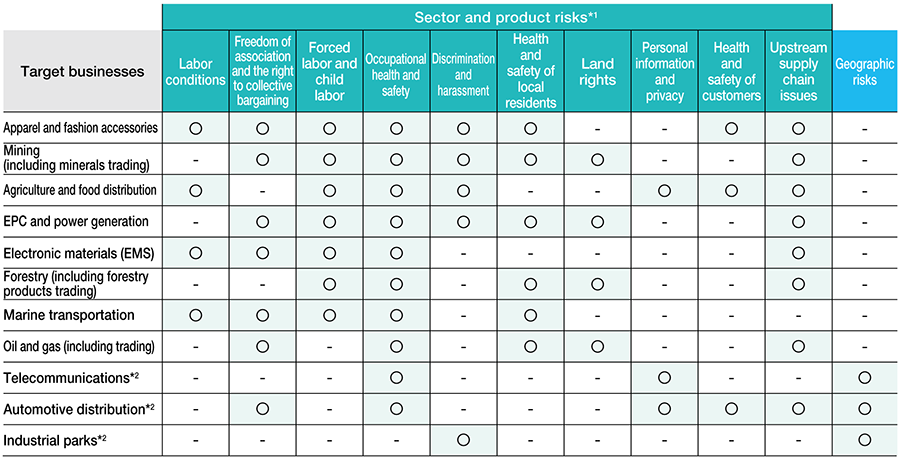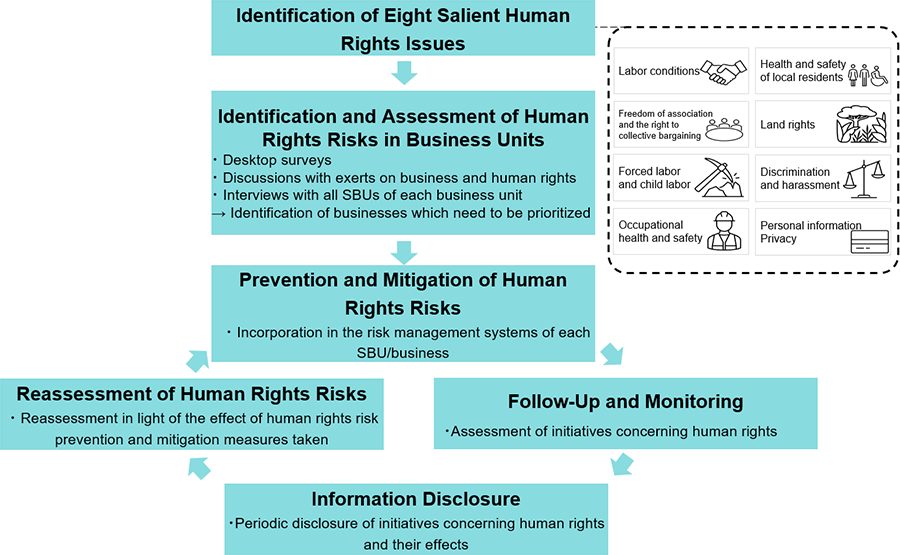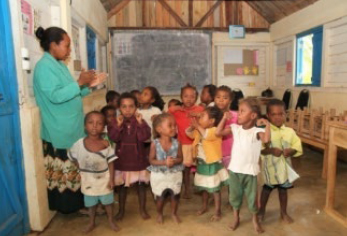View Sumitomo Corporation's Sustainability : Respect for Human Rights
Established in May 2020
Sumitomo Corporation declares in its management principles that it aims to be a global organization that contributes broadly to society and places prime importance on utmost respect for the individual. We will respect human rights to fulfill our corporate social responsibility, and pursue sustainable growth with society.
Sumitomo Corporation became a signatory in 2009 to the “Ten Principles of the United Nations Global Compact”, which advocates for values common to its own management principles, including those regarding human rights and labor. We also respect the “International Bill of Human Rights” and the International Labor Organization’s “Declaration on Fundamental Principles and Rights at Work”, and we operate in accordance with the “United Nations Guiding Principles on Business and Human Rights”.
Efforts to Address the UN Global Compact
The Sumitomo Corporation Group is addressing human rights issues. While complying with laws and regulations in our countries of operation, we support and respect the Ten Principles of the UN Global Compact, as well as the International Labour Organization’s core labor standards of ten conventions in five areas: freedom of association and the effective recognition of the right to collective bargaining, elimination of all forms of forced or compulsory labor, effective abolition of child labor, elimination of discrimination in employment and occupation, and occupational safety and health. With regard to the elimination of discrimination in particular, we have clearly stated that no person should be discriminated against due to human race, nationality, gender, religion, creed, age, origin, physical or mental disability, or other reasons that are not related to business operations. We are also complying with minimum wage requirements based on the labor standards and labor conventions of each country.
As the world population is mostly made up of children and younger generations, the Sumitomo Corporation Group is aware that its corporate activities have an impact on the lives of children both directly and indirectly. For companies, children are family members of employees, as well as important stakeholders who will play future roles in the sustainable development of society. Based on this recognition, we signed the United Nations Global Compact in its support of the Ten Principles, and respect Children’s Rights and Business Principles. We are committed to preventing the violation of children’s rights through our business and social contribution activities.
As part of its commitment to respect human rights, the Sumitomo Corporation Group respects global standards pertaining to the rights of indigenous peoples, including the United Nations Declaration on the Rights of Indigenous Peoples, and the principle of “free, prior and informed consent (FPIC).” In business operations in areas where indigenous peoples reside, we recognize their unique culture and history and comply with applicable laws and regulations of each country or region.
In the operation of its business in countries around the globe, the Sumitomo Corporation Group uses security companies to protect the safety and security of its employees. When necessary, we may use armed security personnel, recognizing the human rights risks involved and complying with laws and regulations of the countries in which we operate. We select security companies in accordance with the Voluntary Principles on Security and Human Rights and the Basic Principles on the Use of Force and Firearms by Law Enforcement Officials.
In accordance with the Sumitomo Corporation Group Human Rights Policy, Sumitomo Corporation began human rights due diligence in 2020 to identify, prevent, and address any adverse human rights impact that the Group business activities may cause or contribute to. In FY2020, as the first step, we worked to identify salient human rights issues that required prioritized action, based on a comprehensive assessment of potential human rights impacts across the Group. From FY2021 to FY2024, we conducted human rights due diligence across all businesses with the support of outside experts, identifying and assessing human rights risks.
Having completed a round of human rights due diligence across all businesses, we will adopt a risk-based approach by implementing enhanced human rights due diligence, including engagement with rights holders. In order to undertake human rights due diligence based on a risk-based approach, it is necessary to identify businesses with high human rights risks. Therefore, in FY 2024, we conducted a company-wide risk mapping exercise based on matters such as the results of human rights due diligence to date as well as the characteristics and risks of each business. Specifically, based on the OECD's due diligence guidance, we took into consideration four risk factors (sector, product, geographic, and enterprise-level) and sought the opinions of outside experts including Sustainability Advisory Board members to identify business areas within the Group that pose high human rights risks. In examining the risk factors, we referred to various sources such as literature, regulations, and external indices, including the following:
Sector and product risks: Based on more than ten authoritative sources and regulations, including the SASB Standards and the U.S. Department of Labor’s “List of Goods Produced by Child Labor or Forced Labor”
Geographic risks: Based on sources such as the Global Rights Index

In organizing the risks associated with each sector and product, we expanded our group’s eight salient human rights issues by adding two additional items—“Customer health and safety” and “Upstream supply chain issues”—bringing the total to ten. These were then combined with geographic risk factors to develop a comprehensive mapping, which was organized as follows.

Timelines and ways of responding to human rights risks vary according to number of factors, including the severity of the risks and their level of involvement in each business. For this reason, each SBU and each group company should be responsible for their related human rights risks. For those risks which we identified and assessed through our human rights due diligence, each SBU and each group company prioritizes the risks based on their severity of the impact, incorporate them into concrete action plans, and implement the plan-do-check-act (PDCA) cycle.
After having conducted a desktop survey in which we identified human rights issues, mainly but not limited to our eight salient human rights issues and referred to the actual cases of human rights risks which occurred in global business activities of ourselves or other companies, we had been conducting human rights due diligence starting from business units whose businesses are considered to have relatively higher human rights risks.
Specifically, interviewing all related SBUs of the business units with the support from outside experts, we confirmed the situation in each business and actual human rights risks including the impact on stakeholders, such as local residents and others related to the supply chain and business activities of each business. Besides, we identified potential risks that could be anticipated and discussed the status of any responses being taken. In light of these findings, and from the perspectives of the possibility to materialize human rights risks which we identified and their severity if materialized, we prioritized SBUs, or individual businesses within SBUs, to focus our prevention and mitigation effort on. After following these processes, with the cooperation of the Corporate Sustainability Department and relevant SBUs and group companies, we have implemented concrete measures to prevent or mitigate the identified human rights risks. Through this process, we are continuously promoting understanding and penetration of the corporate responsibility to respect human rights among the executives and employees of Sumitomo Corporation Group.
Please see here more details on our human rights due diligence.

For human rights risks of forest management and forest product sourcing businesses which EII is taking leads, it is confirmed that responsible group companies take appropriate actions to mitigate environmental and social risks including the rights of indigenous people, working conditions and safety as well as those of suppliers.
We conducted human rights due diligence for the rest of business in EII through interviews mainly on risks such as occupational health and safety, working conditions, and the health and safety of local residents, based on the characteristics of the business. As a result, we did not identify any actual human rights risks or unaddressed potential high risks.

| Main human rights issues | Identified actual and potential risks | Assessment and countermeasures |
|---|---|---|
| Labor conditions, Freedom of association and the right to collective bargaining, Occupational health and safety |
|
|
| Forced labor and child labor |
|
|
| Personal information, Privacy |
|
|

| Main human rights issues | Identified actual and potential risks | Assessment and countermeasures |
|---|---|---|
| Occupational health and safety |
|
|
| Labor conditions, Freedom of association and the right to collective bargaining, Forced labor and Child labor |
|
|
In FY2022, we identified and assessed actual and potential human rights risks in all SBUs of the Infrastructure Business Unit and Mineral Resources, Energy, Chemical & Electronics Business Unit, and confirmed the status of concrete initiatives, such as supplier surveys and improvement activities, for human rights risks of concern associated with the character of the business (product or region, etc.). As for some of the human rights risks identified through discussions, we will consider and implement further strengthening measures. In addition to the promoting of the understanding and entrenchment of the company’s responsibility to respect human rights to officers and employees of the Sumitomo Corporation Group, through this process, we are driving concrete initiatives for human rights education based on the United Nations Guiding Principles on Business and Human Rights. In FY2022, we conducted a training program for all officers and employees of Sumitomo Corporation and achieved our medium-term goal of 100% participation rate.

| Main human rights issues | Identified actual and potential risks | Assessment and countermeasures |
|---|---|---|
| Occupational health and safety, Labor conditions |
|
|
| Health and safety of local residents, Land rights |
|
|
| Health and safety of local residents, Land rights, Labor conditions |
|
|

| Main human rights issues | Identified actual and potential risks | Assessment and countermeasures |
|---|---|---|
| Labor conditions, Occupational health and safety |
|
|
| Forced labor and child labor |
|
|
| Labor conditions, Health and safety of local residents, Land rights |
|
|
| Labor conditions |
|
|
| All |
|
|

| Main human rights issues | Identified actual and potential risks | Assessment and countermeasures |
|---|---|---|
| Labor conditions, Forced labor and child labor |
|
|
| Discrimination and harassment |
|
|
| Personal information Privacy |
|
|
| The right to know and freedom of expression |
|
|
| New human rights issues (AI and data) |
|
|

| Main human rights issues | Identified actual and potential risks | Assessment and countermeasures |
|---|---|---|
| Labor conditions (wages and working hours), Occupational health and safety |
|
|
| Freedom of association and the right to collective bargaining |
|
|
| Forced labor and child labor |
|
|
| Land rights, Health and safety of local residents |
|
|
In addition to an internal whistleblower system for employees, we receive opinions and grievance from external stakeholders, including the general public and customers.
Since FY2024, we have been a regular member of the Japan Center for Engagement and Remedy on Business and Human Rights (JaCER), a general incorporated association that provides a platform for redress of grievances in compliance with the UN Guiding Principles on Business and Human Rights, and we receive various opinions on human rights from external stakeholders on the platform provided by JaCER. We receive opinions through a third party with expertise to improve fairness and transparency. Furthermore, the details of each case are reported to the management, including Chief Sustainability, DE&I Officer and the Corporate Sustainability Committee, to ensure timely and appropriate remediation and recurrence prevention.
In dealing with the report, we ensure that the whistleblower and related parties will not suffer any disadvantages as a result of reporting, and we protect the privacy and confidentiality of the whistleblower.
The progress and results of the response to the received report will be disclosed on the Grievance List on the JaCER website.
Sumitomo Corporation Group’s business activities cover a wide range of countries, regions and industrial fields. As per our Human Rights Policy, we consider that we have a responsibility to work with suppliers and business partners, instead of acting alone, to ensure respect for human rights throughout the entire supply chain, and we have been providing training on respect for human rights with employees. In addition to providing the training programs for the newly appointed manager and mid-career employees, , in FY2024, we expanded and completed the e-learning with respect to the necessity of respecting human rights throughout the supply chain and human rights issues that require attention in conducting business activities to all employees on a non-consolidated basis, to cover overseas regional organizations and consolidated subsidiaries. Also, we held an online study session conducted by an external expert on human rights laws and regulations and external trends, mainly focusing on the contents of the CSDDD. Around 400 employees, including those from subsidiaries attended the session.
Regarding the progress of human rights due diligence in business units and those conducted in some individual businesses where human rights risks are a concern, we engage, as necessary, with various external experts, including lawyers, NGOs, United Nations organizations, and consultants, and reflect on various opinions to improve our efforts. In addition, we have also been working to gain knowledge on human rights through participation in various external initiatives, such as working groups of the UN Global Compact Network Japan and Business and Human Rights Academy of the UNDP.
While AI, advanced technology, enriches people's lives, it is globally pointed out that its development, operation, and utilization may lead to human rights issues such as invasion of privacy and algorithmic discrimination. Recognizing the need to prevent such human rights issues, the Group closely monitors guidelines and discussions of government agencies, academic societies as well as practices conducted by other companies. As we pursue digital transformation (DX) in our various business areas, we will continuously address to ensure that we do not cause human rights violations by protecting the privacy of our customers and users, and preventing unfair discrimination.
We set out the steps Sumitomo Corporation has taken to help ensure that modern slavery and human trafficking are not taking place in all of our business or supply chains. The statement has been approved by the board of directors of Sumitomo Corporation.
Fyffes, one of our group companies and, one of the world’s leading companies in the production and wholesaling of fresh produce, is the only company in its sector to have completed four years of human rights due diligence, starting in 2019. In 2025 Fyffes will undertake its third corporate wide human rights impact assessment, including the environment (HREIA).

During 2024, Fyffes worked with an independent human rights expert to conduct on-site, in-depth HREIAs in Belize on its own banana farms, and with two banana suppliers in Costa Rica.
In addition to HREIAs, Fyffes has conducted independent Community Needs Assessment (CNA) in six countries, in 55 local communities surrounding our operations, acknowledging their concerns and interests while managing or mitigating the potential or actual risks that our operations may have on them. Over 3,000 people were interviewed anonymously as part of the CNAs.
Fyffes has had a United Nations Guiding Principles-compliant grievance mechanism available to employees and stakeholders since 2019. In 2023 Fyffes changed the provider of its grievance mechanism to address failings in network coverage in Honduras and Belize. The hotline is communicated to employees via email, via posters in farms and ripening centers and via townhalls. The hotline is available for stakeholders to report misconduct against the company’s Code of Conduct – the Fyffes Principles of Responsible Business Conduct. Grievances are managed according to the Fyffes Ethics Committee Terms of Reference and Grievance Procedures and are received, assessed and investigated by the Fyffes Ethics Committee. The Ethics Committee is comprised of the Chief Corporate Affairs Officer, the Chief Human Resources Officer, the Chief Legal & Compliance Officer and the Ethical Compliance Manager.
Fyffes has trained 100% of its own workers on human rights and the company has a target and is on track to ensure 100% of supply chain workers are trained on human rights by 2030 with 12% of suppliers’ workers already trained... Fyffes also has a target and is on track to ensure 100% of its own workers and 50% of supply chain workers are trained on gender equality.
Fyffes does not tolerate any forced labor nor migrant human rights violations and continues to conduct and participate in internal and third-party ethical and social audits, including Sedex Members Ethical Trade Audit (SMETA) audits throughout a large proportion of its supply chain, such as Fyffes owned farms, various grower partners and ripening facilities. In the UK, Fyffes Group Ltd has regular audits on its labor providers and investigates any signs of forced labor, e.g. retention of passports etc. Fyffes has formed a Human Rights and Environmental Due Diligence Committee and they are responsible for implementing mitigation measures to address the salient human rights risks. This Committee oversees the resolution of 86 separate mitigation actions to ensure Fyffes is fully compliant with the Corporate Sustainability Due Diligence Directive which will apply to Fyffes in 2028. Fyffes has committed to conducting a human rights impact assessment annually and an independent HRIA every third year. In September 2024, Fyffes published its third Human Rights Report, way ahead of its competitors and the vast majority of its customers.
During 2024 Fyffes strengthened its third-party due diligence by introducing a Supplier Code of Conduct and Due Diligence Policy [https://www.fyffes.com/our-story/policy-documents/ ] and both are referred to in contracts with suppliers. To enforce these requirements, Fyffes introduced Responsible Supply Chain team, formerly called compliance reporting directly to the Chief Corporate Affairs Officer, who oversees sustainability.
This team has been trained in conducting investigations into allegations of human rights and environmental misconduct in our grower supply chain. This work was undertaken as part of Fyffes CSDDD readiness.
Also in 2024, Fyffes Board of Directors approved an Ethical Compliance Charter under the Chief Legal and Compliance Officer.
In 2021, Fyffes published its first Sustainability Report. The report shared its 13 ambitious sustainability targets under the four focus areas "Stewardship for the Planet," "Enriching People’s Lives," "Healthy Food for Healthy Lives," and "Fyffes Principles of Responsible Business Conduct." Fyffes sustainability targets are specifically aligned to nine United Nations Sustainable Development Goals and include six targets relating to human rights, including a commitment to train 100% of its employees, contractors and supply chain workers on human rights. Fyffes second Sustainability Report was published in September 2023 and the company will publish its third GRI-compliant Sustainability Report in September 2025.


We also urge suppliers and other trading partners as well as business partners to take action in order to promote respect for human rights throughout entire value chains related to Sumitomo Corporation Group businesses. As a specialized food and food products trading company that is involved in all processes from product development to selection of production areas in regions around the world, procurement of ingredients, production and processing management, logistics, and domestic distribution, SC Foods Co., Ltd. conducts supply chain management so that it can provide safe, reassuring, and high-quality products that take into consideration sustainability including respect for human rights.
Surveys are being conducted sequentially on products procured from overseas , and after completing investigations with all counterparts, the scope is being expanded to domestic counterparts. Furthermore, based on the survey results, for those identified as high-risk, measures to prevent or mitigate the risks are being considered and implemented. The outcomes are monitored, and a PDCA cycle for human rights due diligence is being established to lead to further improvements.
Due to the history of apartheid in South Africa, there are policies that aim to reduce inequality in rights and opportunities for black people to participate in economic activities and to improve their social status. It is required to include at least a certain number of black companies in a business project and to give back part of the profits to the community.
To comply with such policies, Dorper Wind Farm company, in which we invest, offers cooperation in improving the living environment of local residents and creating new jobs. Specific efforts include donation of equipment and refurbishment of buildings at kindergartens, schools and hospitals located close to the power plant, and support to restaurants operated by black women. Through these activities, we appoint local companies where possible. A portion of the shares of Dorper Wind Farm company are owned by local sponsors run by local residents and dividends distributed to such sponsors are used for various projects that meet the needs of local residents.
In promoting resource development projects, understanding of local areas is essential. In the development project of the Ambatovy nickel mine in Madagascar, we have taken the initiative in having dialogues with the government and local residents, in cooperation with the diplomatic corps and lending banks group since the start of the development. We use these dialogues to share our belief that “this project is extremely important to the future of Madagascarˮ and deepen the mutual understanding of the significance of the project. In the Ambatovy project, we also promote the employment of people in Madagascar and improve their skills. In FY2024, about 89% of all workers are Madagascar people, and we are systematically working on technology transfer and human resource development for them. We have a complaint system to receive any kind of complaints, including human rights violations, in cooperation with local communities, in order to prevent accidents associated with the project and address them if they occur. Employees and external stakeholders are eligible to access this system. Project staff appropriately respond to complaints while protecting personal information. Since 2016, the Ambatovy project has joined the Voluntary Principles on Security and Human Rights (VPSHR) program in partnership with NGOs, the Madagascar government and other countries' embassies.

An elementary school built within the project site
Since 2014, Sumitomo Corporation and KDDI Corporation through KDDI Summit Global Myanmar Co., Ltd. (KSGM), a joint venture established between the two companies, have supported Myanma Posts and Telecommunications (MPT), one of Myanmar’s licensed telecommunications service providers, inter alia to develop communication infrastructure, establish business locations, and enhance marketing activities, enabling the delivery of high-quality telecommunications infrastructure and services which have contributed to the economic growth and the welfare of people in Myanmar.
Since the declaration of the state of emergency in Myanmar in 2021, the situation in Myanmar has undergone significant changes, and our business operations have faced considerable difficulties. However, through technical know-how transfer and human resource development, which comprise the reduced scope of KSGM’s support for MPT from FY 2025 onward, we continue to pursue our business purpose, namely to improve the lives of the people of Myanmar.
Recognizing the worsening human rights situation in Myanmar, in 2022, Sumitomo Corporation appointed respected international human rights consultants to undertake a human rights impact assessment, in line with our Group Human Rights Policy. Their recommendations included: ensure the safety of all employees; conduct ongoing human rights due diligence; and engage in dialogue with and support trusted stakeholders. Based on these recommendations, we took concrete actions. Under the guidance of human rights experts, we engaged with various stakeholders in 2024/2025, including local and international NGOs. These dialogues reaffirmed the importance of maintaining and securing telecommunications networks for the people of Myanmar in the context of respecting human rights. We also received feedback from stakeholders requesting us to conduct ongoing human rights due diligence and provide transparent communication regarding our human rights initiatives.
Furthermore, in response to the major earthquake that struck Myanmar in late March 2025, we provided extensive support to ensure the rapid restoration of telecommunications networks. From a humanitarian perspective, we also contributed disaster relief and assisted in the recovery of essential infrastructure.
Looking ahead, we remain committed to ongoing dialogue with stakeholders, incorporating insights from independent experts in the field of business and human rights to develop and implement action plans that promote respect for human rights. In addition, we will continue to closely monitor developments in Myanmar from the standpoint of the business environment and consider appropriate actions as necessary.
For further details on our previous disclosures, please refer to the following links: